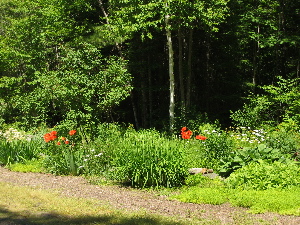SUNFLOWER SEED FOR THE BIRDS
Here's a little section from the National Gardening Association's Regional Report that I receive via e-mail. After you read it, keep reading...I have a few comments of my own to make about this problem.
"If you've noticed disease in the past on plants near your bird feeder, particularly if infected parts are covered with white fluffy growth, the problem could be a fungus that's contained in sunflowers seeds. In addition, sunflower seed hulls themselves can impede the growth of certain plants, so to be on the safe side, move your feeder away from your gardens. If that's not possible, periodically clean up any seeds and hulls around the base of the feeder and destroy them."
This is true, those sunflower seed hulls are toxic to grass, which is the plant often right under our feeders. In the spring you'll find the lawn is in terrible shape under the feeder. That's not nice!
This is relatively easy to control. Just buy, and use, shelled sunflower seeds. They are also called Sunflower Hearts. There will be NO seed hulls cast to the lawn, because there aren't any. This type of seed IS more expensive, but what you get is almost entirely consumed by the birds. The ground feeding birds, like Juncos and Cardinals will happily pick them off the ground...and there's always that "friendly" little squirrel who's willing to help with clean-up chores. You'll also find that the birds are less prone to toss seeds to the ground. I'm sure you have noticed that the birds will often throw away 3 or 4 seeds to every one they eat. Using the hearts, they are more likely to eat each one. At least try it. I find the clean-up in the spring is negligible.





1 Comments:
I frantically raked up sunflower seed hulls three or four times last winter because I was sure the lawn in the back yard would never recover, but in the end, I wound up moving the feeder and digging up the grass to put in garden beds :-)
Where the feeder is now the ground is all clover in summer anyway, so I'm not bothering to rake this year.
Post a Comment
<< Home